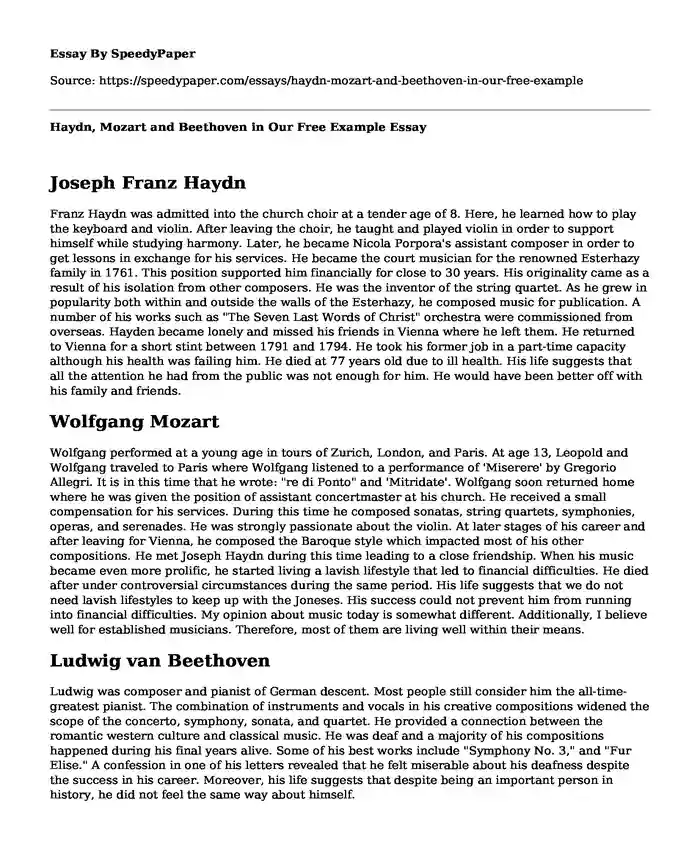Joseph Franz Haydn
Franz Haydn was admitted into the church choir at a tender age of 8. Here, he learned how to play the keyboard and violin. After leaving the choir, he taught and played violin in order to support himself while studying harmony. Later, he became Nicola Porpora's assistant composer in order to get lessons in exchange for his services. He became the court musician for the renowned Esterhazy family in 1761. This position supported him financially for close to 30 years. His originality came as a result of his isolation from other composers. He was the inventor of the string quartet. As he grew in popularity both within and outside the walls of the Esterhazy, he composed music for publication. A number of his works such as "The Seven Last Words of Christ" orchestra were commissioned from overseas. Hayden became lonely and missed his friends in Vienna where he left them. He returned to Vienna for a short stint between 1791 and 1794. He took his former job in a part-time capacity although his health was failing him. He died at 77 years old due to ill health. His life suggests that all the attention he had from the public was not enough for him. He would have been better off with his family and friends.
Wolfgang Mozart
Wolfgang performed at a young age in tours of Zurich, London, and Paris. At age 13, Leopold and Wolfgang traveled to Paris where Wolfgang listened to a performance of 'Miserere' by Gregorio Allegri. It is in this time that he wrote: "re di Ponto" and 'Mitridate'. Wolfgang soon returned home where he was given the position of assistant concertmaster at his church. He received a small compensation for his services. During this time he composed sonatas, string quartets, symphonies, operas, and serenades. He was strongly passionate about the violin. At later stages of his career and after leaving for Vienna, he composed the Baroque style which impacted most of his other compositions. He met Joseph Haydn during this time leading to a close friendship. When his music became even more prolific, he started living a lavish lifestyle that led to financial difficulties. He died after under controversial circumstances during the same period. His life suggests that we do not need lavish lifestyles to keep up with the Joneses. His success could not prevent him from running into financial difficulties. My opinion about music today is somewhat different. Additionally, I believe well for established musicians. Therefore, most of them are living well within their means.
Ludwig van Beethoven
Ludwig was composer and pianist of German descent. Most people still consider him the all-time-greatest pianist. The combination of instruments and vocals in his creative compositions widened the scope of the concerto, symphony, sonata, and quartet. He provided a connection between the romantic western culture and classical music. He was deaf and a majority of his compositions happened during his final years alive. Some of his best works include "Symphony No. 3," and "Fur Elise." A confession in one of his letters revealed that he felt miserable about his deafness despite the success in his career. Moreover, his life suggests that despite being an important person in history, he did not feel the same way about himself.
Cite this page
Haydn, Mozart and Beethoven in Our Free Example. (2022, Jul 12). Retrieved from https://speedypaper.net/essays/haydn-mozart-and-beethoven-in-our-free-example
Request Removal
If you are the original author of this essay and no longer wish to have it published on the SpeedyPaper website, please click below to request its removal:
- Examples of Sociological Imagination, Free Essay
- Free Essay Sample on Targeted Marketing and Marketing Concepts
- Free Paper Sample on Arts and Culture Management
- Essay Sample Dedicated to the Differences Between Crisis Management and Risk Management
- Free Essay Sample on The Environment Impacts of Factory Farming
- Essay Example on Protection Motivation Theory (PMT) in the Health Sector
- Black Women's Voices in Poetry: Creative Expression & Activism
Popular categories





